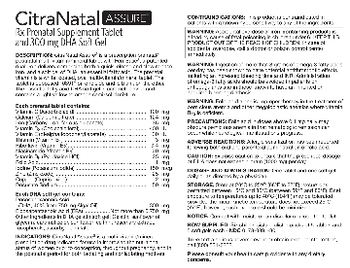CitraNatal Assure 300 mg DHA Soft Gel

Product Type
supplement
Packaging Size
Serving Size
1.0 Softgel(s),
Ingredients
| docosahexaenoic acid | 300.0 | mg |
| eicosapentaenoic acid | 0.75 | mg |
Description
Lactating Pregnant Women Adult Female (18 - 50 Years) NP How supplied: Six child-resistant blister packs of 5 tablets and 5 soft gels each - NDC 0178-0891-30 Please consult your health care provider with any dietary concerns. Storage: Store at 20(0)C to 25(0)C (68(0)F to 77(0)F), excursions permitted between 15(0)C and 30(0)C (between 59(0)F and 86(0)F). Brief exposure to temperatures up to 40(0)C (104(0)F) may be tolerated provided the mean kinetic temperature does not exceed 25(0)C (77(0)F); however, such exposure should be minimized. Dosage and administartion: One tablet and one soft gel daily or as directed by a physician.
Formulation
Description: CitraNatal Assure is a prescription prenatal/postnatal multi vitamin/mineral tablet with Ferr-Ease, a patented dual-iron delivery comprising both a quick release and slow release iron, and a soft gel of DHA, an essential fatty acid. The prenatal vitamin is a white, coated, oval multi-vitamin/mineral tablet. The tablet is debossed “0891” on one side and is blank on the other. The essential fatty acid DHA soft gel is caramel colored and contains a light yellow to orange semi-solid mixture. Indications: CitraNatal Assure is a multi-vitamin/mineral prescription drug indicated for use in improving the nutritional status of women prior to conception, throughout pregnancy, and in the postnatal period for both lactating and nonlactating mothers.
Precautions
Caution: Exercise caution to ensure that the prescribed dosage of DHA does not exceed 1 gram (1000 mg) per day. To report a serious adverse event or obtain product information, call (800) 531-3333. Warning: Ingestion of more than 3 grams of omega-3 fatty acids per day has been shown to have potential antithrombotic effects, including an increased bleeding time and INR. Administration of omega-3 fatty acids should be avoided in patients on anticoagulants and in those known to have an inherited or acquired bleeding diathesis.